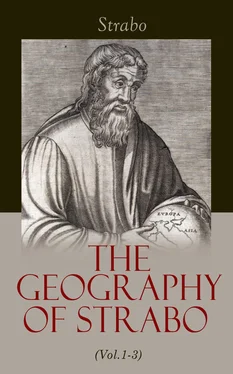“Thee the gods
Have destined to the blest Elysian isles,
Earth’s utmost boundaries. Rhadamanthus there
For ever reigns, and there the human kind
Enjoy the easiest life; no snow is there,
No biting winter, and no drenching shower,
But Zephyr always gently from the sea
Breathes on them, to refresh the happy race.” 9
5. The Isles of the Blest 10are on the extreme west of Maurusia, 11near where its shore runs parallel to the opposite coast of Spain; and it is clear he considered these regions also Blest, from their contiguity to the Islands.
6. He tells us also, that the Ethiopians are far removed, and bounded by the ocean: far removed,—
“The Ethiopians, utmost of mankind,
These eastward situate, those toward the west.” 12
Nor was he mistaken in calling them separated into two divisions, as we shall presently show: and next to the ocean,—
“For to the banks of the Oceanus,
Where Ethiopia holds a feast to Jove,
He journey’d yesterday.” 13
Speaking of the Bear, he implies that the most northern part of the earth is bounded by the ocean:
“Only star of those denied
To slake his beams in Ocean’s briny baths.” 14
Now, by the “Bear” and the “Wain,” he means the Arctic Circle; otherwise he would never have said, “It alone is deprived of the baths of the ocean,” when such an infinity of stars is to be seen continually revolving in that part of the hemisphere. Let no one any longer blame his ignorance for being merely acquainted with one Bear, when there are two. It is probable that the second was not considered a constellation until, on the Phœnicians specially designating it, and employing it in navigation, it became known as one to the Greeks. 15Such is the case with the Hair of Berenice, and Canopus, whose names are but of yesterday; and, as Aratus remarks, there are numbers which have not yet received any designation. Crates, therefore, is mistaken when, endeavouring to amend what is correct, he reads the verse thus:
Οἶος δ’ ἄμμορός ἐστι λοετρῶν,
replacing οἴη by οἶος, with a view to make the adjective agree with the Arctic Circle, which is masculine; instead of the Arctic Constellation, which is feminine. The expression of Heraclitus is far more preferable and Homeric, who thus figuratively describes the Arctic Circle as the Bear,—“The Bear is the limit of the dawn and of the evening, and from the region of the Bear we have fine weather.” Now it is not the constellation of the Bear, but the Arctic Circle, which is the limit of the rising and the setting stars.
By the Bear, then, which he elsewhere calls the Wain, and describes as pursuing Orion, Homer means us to understand the Arctic Circle; and by the ocean, that horizon into which, and out of which, the stars rise and set. When he says that the Bear turns round and is deprived of the ocean, he was aware that the Arctic Circle [always] extended to the sign opposite the most northern point of the horizon. Adapting the words of the poet to this view, by that part of the earth nearest to the ocean we must understand the horizon, and by the Arctic Circle that which extends to the signs which seem to our senses to touch in succession the most northern point of the horizon. Thus, according to him, this portion of the earth is washed by the ocean. With the nations of the North he was well acquainted, although he does not mention them by name, and indeed at the present day there is no regular title by which they are all distinguished. He informs us of their mode of life, describing them as “wanderers,” “noble milkers of mares,” “living on cheese,” and “without wealth.” 16
7. In the following speech of Juno, he states that the ocean surrounds the earth.
“For to the green earth’s utmost bounds I go,
To visit there the parent of the gods,
Oceanus.” 17
Does he not here assert that ocean bounds all its extremities, and does it not surround these extremities? Again, in the Hoplopœia, 18he places the ocean in a circle round the border of Achilles’ shield. Another proof of the extent of his knowledge, is his acquaintance with the ebb and flow of the sea, calling it “the ebbing ocean.” 19Again,
“Each day she thrice disgorges, and again
Thrice drinks, insatiate, the deluge down.” 20
The assertion of thrice, instead of twice, is either an error of the author, or a blunder of the scribe, but the phenomenon is the same, and the expression soft-flowing, 21has reference to the flood-tide, which has a gentle swell, and does not flow with a full rush. Posidonius believes that where Homer describes the rocks as at one time covered with the waves, and at another left bare, and when he compares the ocean to a river, he alludes to the flow of the ocean. The first supposition is correct, but for the second there is no ground; inasmuch as there can be no comparison between the flow, much less the ebb of the sea, and the current of a river. There is more probability in the explanation of Crates, that Homer describes the whole ocean as deep-flowing, ebbing, and also calls it a river, and that he also describes a part of the ocean as a river, and the flow of a river; and that he is speaking of a part, and not the whole, when he thus writes:—
“When down the smooth Oceanus impell’d
By prosperous gales, my galley, once again,
Cleaving the billows of the spacious deep,
Had reach’d the Ææan isle.” 22
He does not, however, mean the whole, but the flow of the river in the ocean, which forms but a part of the ocean. Crates says, he speaks of an estuary or gulf, extending from the winter tropic towards the south pole. 23Now any one quitting this, might still be in the ocean; but for a person to leave the whole and still to be in the whole, is an impossibility. But Homer says, that leaving the flow of the river, the ship entered on the waves of the sea, which is the same as the ocean. If you take it otherwise you make him say, that departing from the ocean he came to the ocean. But this requires further discussion.
8. Perception and experience alike inform us, that the earth we inhabit is an island: since wherever men have approached the termination of the land, the sea, which we designate ocean, has been met with: and reason assures us of the similarity of those places which our senses have not been permitted to survey. For in the east 24the land occupied by the Indians, and in the west by the Iberians and Maurusians, 25is wholly encompassed [by water], and so is the greater part on the south 26and north. 27And as to what remains as yet unexplored by us, because navigators, sailing from opposite points, have not hitherto fallen in with each other, it is not much, as any one may see who will compare the distances between those places with which we are already acquainted. Nor is it likely that the Atlantic Ocean is divided into two seas by narrow isthmuses so placed as to prevent circumnavigation: how much more probable that it is confluent and uninterrupted! Those who have returned from an attempt to circumnavigate the earth, do not say they have been prevented from continuing their voyage by any opposing continent, for the sea remained perfectly open, but through want of resolution, and the scarcity of provision. This theory too accords better with the ebb and flow of the ocean, for the phenomenon, both in the increase and diminution, is every where identical, or at all events has but little difference, as if produced by the agitation of one sea, and resulting from one cause.
9. We must not credit Hipparchus, who combats this opinion, denying that the ocean is every where similarly affected; or that even if it were, it would not follow that the Atlantic flowed in a circle, and thus continually returned into itself. Seleucus, the Babylonian, is his authority for this assertion. For a further investigation of the ocean and its tides we refer to Posidonius and Athenodorus, who have fully discussed this subject: we will now only remark that this view agrees better with the uniformity of the phenomenon; and that the greater the amount of moisture surrounding the earth, the easier would the heavenly bodies be supplied with vapours from thence.
Читать дальше












![Anne Blunt - A Pilgrimage to Nejd, the Cradle of the Arab Race. Vol. 2 [of 2]](/books/750183/anne-blunt-a-pilgrimage-to-nejd-the-cradle-of-the-thumb.webp)